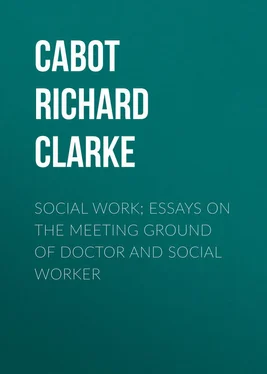Richard Cabot - Social Work; Essays on the Meeting Ground of Doctor and Social Worker
Здесь есть возможность читать онлайн «Richard Cabot - Social Work; Essays on the Meeting Ground of Doctor and Social Worker» — ознакомительный отрывок электронной книги совершенно бесплатно, а после прочтения отрывка купить полную версию. В некоторых случаях можно слушать аудио, скачать через торрент в формате fb2 и присутствует краткое содержание. Жанр: foreign_antique, foreign_prose, на английском языке. Описание произведения, (предисловие) а так же отзывы посетителей доступны на портале библиотеки ЛибКат.
- Название:Social Work; Essays on the Meeting Ground of Doctor and Social Worker
- Автор:
- Жанр:
- Год:неизвестен
- ISBN:нет данных
- Рейтинг книги:3 / 5. Голосов: 1
-
Избранное:Добавить в избранное
- Отзывы:
-
Ваша оценка:
- 60
- 1
- 2
- 3
- 4
- 5
Social Work; Essays on the Meeting Ground of Doctor and Social Worker: краткое содержание, описание и аннотация
Предлагаем к чтению аннотацию, описание, краткое содержание или предисловие (зависит от того, что написал сам автор книги «Social Work; Essays on the Meeting Ground of Doctor and Social Worker»). Если вы не нашли необходимую информацию о книге — напишите в комментариях, мы постараемся отыскать её.
Social Work; Essays on the Meeting Ground of Doctor and Social Worker — читать онлайн ознакомительный отрывок
Ниже представлен текст книги, разбитый по страницам. Система сохранения места последней прочитанной страницы, позволяет с удобством читать онлайн бесплатно книгу «Social Work; Essays on the Meeting Ground of Doctor and Social Worker», без необходимости каждый раз заново искать на чём Вы остановились. Поставьте закладку, и сможете в любой момент перейти на страницу, на которой закончили чтение.
Интервал:
Закладка:
Still, again, the visitor may find that the symptoms are neither more serious nor less serious than he would have supposed from the dispensary interview; yet the clinical picture is different from the doctor's because the patient has thrust into the foreground of the clinical picture something which further knowledge shows to be really unimportant, while he has said almost nothing of some other feature of the trouble which is really much more serious. For example how much does the patient really eat, how does he do his work, are there complaints about him from his "boss," has he always had the cough which he has only just now begun to complain of? Such questions can be better answered after visits at the home and talks with the whole family.
Clearly the supplementary information thus secured by the social worker will count for nothing unless clearly explained to the doctor, and is taken up by him as part of the evidence on which he bases his diagnosis and his treatment. It is absolutely essential that the social worker should not merely make her visits and record them in her notebook, but should incorporate her findings in the medical record and deliver them not formally but effectively to the doctor's mind.
Such help is needed because she can often learn far more in the quiet of an interview at home than would be possible for the doctor despite all his medical skill. For at the dispensary he questions the patient when he is confused and forgetful, alarmed, perhaps, by the sights and sounds of the clinic, and so very unlikely to give a correct and well-balanced account.
So far I have been describing the work of the social worker as a process of finding out how much ails the patient and what his symptoms signify. But it is also a part of the social worker's duty to find how much disease is present not only in the individual who appears in the clinic, but in his immediate environment, to discover nests, foci or hotbeds of disease . In the case of a disease like smallpox, this is obvious. If a patient presented himself at a dispensary with the pustules of smallpox upon his body, it would be criminal negligence on the part of the physician not to set on foot a search of that patient's home, his industrial environment, or, in the case of a child, his school environment, for evidence that others have been exposed to the same contagion and possibly already infected. This sort of duty cannot be abandoned merely because there is no health officer at hand. It is a crying need and must be attended to at once.
Now in a minor degree this is true of many other diseases as well as smallpox. We are beginning to realize that it is true of tuberculosis, so that when one case of advanced and therefore contagious tuberculosis is seen at the dispensary, machinery should automatically and invariably be set in motion to search out possible paths of contagion from that patient to others, just as if he had smallpox.
This principle which is well established in the case of dangerous contagious diseases like smallpox and diphtheria, and is beginning to be established in relation to tuberculosis, is even more important in dealing with syphilis. Every case of syphilis means more cases of syphilis, and the danger of still more each day that the contagious patient is at large. No physician has done his duty unless, after seeing a case of syphilis, he attempts, through a social worker or otherwise, to get knowledge of others from whom this disease has been acquired, or to whom it may be freshly spread. At the Massachusetts General Hospital each patient with syphilis is asked to bring to the clinic for treatment the person who infected him. The method sounds impossible but in fact it works , and many cases are thus brought under treatment and prevented from infecting others.
With contagious skin diseases such as scabies or impetigo, the principle is obviously the same, though the dangers of disregarding it are not so great. With typhoid fever, which not very infrequently shows itself even at a dispensary, the duty of the social worker is not so much to search for other persons through whom it may have been contracted or to whom it may be spread, as to investigate the water-supply and the milk-supply of the patient and of others in his environment. One case of typhoid always means more cases, usually more cases acquired, not by contact with one another, but through their share in a contaminated water-supply or milk-supply. The social worker, therefore, should know how to search out contaminated water-supplies, or at least to put in motion such machinery of public health investigation in the city or town where the case arises as may lead to good detective work in the attempt to track down the source of the trouble. It has been well said that every case of typhoid is some one's fault. It has even been asserted that for every case of typhoid some one should be punished. Certainly there are some grounds for such an assertion.
Commoner and not less important than the contagious diseases that I have just mentioned are industrial diseases, or diseases aggravated by the conditions of industry. A physician may serve for many months in a dispensary without seeing a case of smallpox, of trichiniasis, or of typhoid fever, or feeling it his duty to set in motion the forces that I have just mentioned for rooting out the sources of contagion and preventing their further spread. But he cannot serve a month in any well-attended dispensary without seeing cases of industrial disease in the narrow sense, such as lead poisoning, or of independent disease aggravated by the conditions of industry, such as the functional neuroses of cigar-makers or of telephone operators. With such diseases, as with the infectious and contagious diseases, the presence of one case in the clinic should lead straight to the inference that there are others elsewhere, out of sight but no less important from the point of view of public good. This conclusion should lead in turn to the search through a social worker for the cases of disease which do not present themselves to any physician, which may be totally unknown even to the patient himself, yet which are important to the health of the nation.
Difficult though this field of industrial disease has shown itself to be, difficult though it is to separate out that portion of the patients' complaints which can justly be referred to the conditions of his work, and to distinguish it from the portions which are due to the way he lives, to his inheritance, to his habits or to diseases like tuberculosis and syphilis which may have been acquired without any connection with his work, – nevertheless we must try to disentangle and to recognize the elements in this knotty problem. And we can hardly fail to see that the social worker is an essential and logical assistant in the processes of investigation which we must carry out. If we can ever unravel the tangled skein of causes and effects whereby the hours of work, the strain of work, the patients' heredity and his home conditions, all combine to produce the symptoms of disease, it will be through such intimate, prolonged, detailed studies as the social worker can carry out, especially if she becomes a friend of the family. The doctor in his hours of consultation at the dispensary certainly can never do it. The official agent of the Board of Health, perhaps feared, certainly not a natural confidant for the family, may easily miss the truth which the social worker unearths, provided always she succeeds in differentiating herself altogether from the impersonal and professional investigator, and gradually becomes in the mind of the family and in truth their friend.
I said above that the social worker should try to find out what disease, how much disease, and why this disease is present. The answers to these three questions cannot be kept separate. If one knows how much importance to attribute to a given symptom and whether it is as bad as it seems or worse than it seems in the dispensary interview, one may be steered straight to a correct diagnosis. To know how much disease may thus mean knowing what disease is present. Furthermore, the understanding of these questions, even though it be only partial and unsatisfactory, leads us a considerable distance towards understanding why the disease has arisen. The search for sources for contagion is an example of a search for a why in disease. The search for psychical factors – groundless fears, misleading newspaper advertisements, distracting rumors – all this is also a search for the cause as well as for the nature of disease.
Читать дальшеИнтервал:
Закладка:
Похожие книги на «Social Work; Essays on the Meeting Ground of Doctor and Social Worker»
Представляем Вашему вниманию похожие книги на «Social Work; Essays on the Meeting Ground of Doctor and Social Worker» списком для выбора. Мы отобрали схожую по названию и смыслу литературу в надежде предоставить читателям больше вариантов отыскать новые, интересные, ещё непрочитанные произведения.
Обсуждение, отзывы о книге «Social Work; Essays on the Meeting Ground of Doctor and Social Worker» и просто собственные мнения читателей. Оставьте ваши комментарии, напишите, что Вы думаете о произведении, его смысле или главных героях. Укажите что конкретно понравилось, а что нет, и почему Вы так считаете.












